For chemists in politically and economically unstable countries, life is a struggle. Working with few resources and little funding, often against a backdrop of protests, even the basics of daily life can be hard. On top of this, international sanctions designed to pressure, restrict or penalise their governments hamper scientists’ work and cut them off from the wider chemistry community. In the face of such adversity, they remain hopeful for a better future.
Venezuela in meltdown
The political situation in Venezuela has recently gone from bad to worse, following a widely boycotted election in 2018 and popular protests against Nicolás Maduro’s presidency. Over the last decade the degradation of Venezuela’s infrastructure and a deteriorating humanitarian situation has led 3 million Venezuelans (one in ten) to leave the country.
In January, the US imposed economic sanctions on the Venezuela’s petroleum, gold, mining and banking industries. A block on currency exchange has made the country increasingly isolated and in May all flights between the US and Venezuela were suspended.
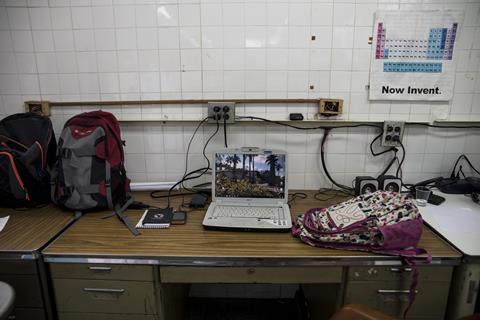
The impact on universities has been huge. Government funding has dramatically decreased and the effects of hyperinflation mean that universities can barely pay for salaries, let alone research. ‘There is no state funding, thus research is either marginal or non-existing. No regular teaching is possible because the university budget is a very low fraction of what is needed,’ says Socrates Acevedo, a chemist at the Central University of Venezuela in Caracas. ‘Most public universities are working under very harsh conditions and some of them are closed at the moment,’ says Benjamin Scharifker, an electrochemistry professor at Simón Bolívar University (USB) and rector of the private Metropolitan University in Caracas. Of Venezuela’s 100 universities, about 70 are publicly funded including the most prestigious research intensive institutions such as USB.
People have to concentrate on getting food … how can we do research?
Benjamin Scharifker, Simón Bolívar University
Scharifker explains, ‘[at USB] we have deficiencies in the provision of [electricity] and in a normal week you will have running water only 2 or 3 days, so it’s impossible to run experiments in a continuous way.’ Academic salaries have fallen to $10-20 per month, which means many teachers struggle with basics like food and travel, says Acevedo. Academics have left the country or moved to non-academic jobs and about half of the students have given up on their university courses . ‘My electrochemistry research group used to have five teaching staff and around 15–20 research students and all the research staff apart from myself have left the country - my two senior colleagues left for Spain and the US and two junior colleagues both left for Argentina,’ recounts Scharifker. At least 1600 professors have been forced to leave the five main public universities since 2012 due to financial pressures.
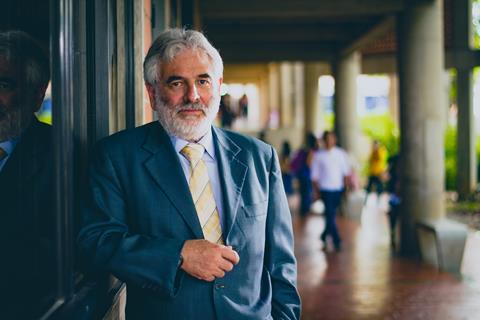
Former USB chemist Simon Lopez made the decision to leave Venezuela in 2014. He was on sabbatical at the University of Florida and was unable to exchange his Venezuelan salary for dollars due to currency restrictions imposed by the Venezuelan government: ‘[My wife and I] decided to quit our jobs and not to return. It was a hard decision: I was a full professor, I had my lab, all my life there, but now I think it was the right decision.’ For the last five years he has worked as an adjunct lecturer, on short-term contracts, but unlike many of his colleagues he has been able to continue his research.
Venezuela’s research output has decreased dramatically over the last two decades. Around 1997 Venezuela produced 6% of Latin American chemistry publications, that figure is now 1% . ‘People have to concentrate more on getting food and the basics like gasoline or electricity or water, how can we do research?’ asks Scharifker. ‘Even if you have the funds, it’s very difficult to bring things from abroad.’
The situation has also made collaboration increasingly difficult. Lopez has tried to assist colleagues, but says it has been impossible to send samples between Venezuela and the US; ‘now there is practically no communication between the countries’.
Collaboration with Venezuela’s once-flourishing chemicals industry has also faltered. The country’s natural resources had supported an extensive oil, gas and petrochemicals industry, which manufactured and exported pesticides, insecticides, resins, explosives, and other chemicals . In the 1980s, chemists worked with industry to develop Orimulsion, an emulsion of bitumen in water used as fuel, and exploiting the vanadium and nickel in its oil reserves as catalysts for cracking and hydrogenation was an active area of research. But in the last 20 years the oil industry has collapsed under economic mismanagement and corruption.
War and revolution
Sudan’s 22-year civil war ended in 2005 and the country is still recovering from the effects of the conflict. Economic sanctions imposed by the US and EU due to human rights violations in the Darfur region have also prevented businesses trading with Sudan. Most of these sanctions were lifted in 2017, but residual US sanctions linked to Sudan’s listing as a state sponsor of terrorism have kept the economy in a stranglehold.
A series of currency devaluations created severe hardships and in December 2018 demonstrators calling for freedom, justice, peace and regime change took to the streets. After several months of protests and violent suppression, President Omar al-Bashir was removed, leaving a military council in power. Further demonstrations and violence have now led to a power sharing agreement, with the promise of future elections.
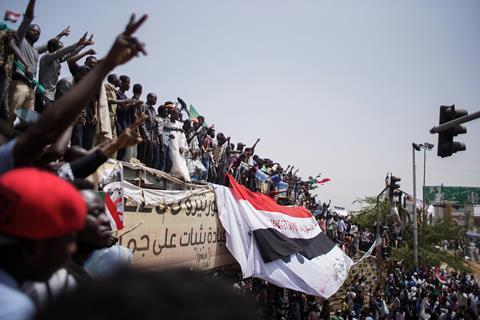
Universities have been closed since the start of the protest movement says Mustafa Abbas Mustafa, director of the Materials and Nanotechnology Research Centre at the University of Khartoum: ‘The previous regime closed the universities and schools for a while, but universities never went back. Now, five months [later] there are no postgraduates or undergraduates in Khartoum University.’
‘The [international] sanctions have been theoretically lifted but we are still on the list of terrorist states and so, for example you cannot log into many [international] websites,’ says Mustafa. ‘The sanctions in Sudan have affected the purchasing of equipment, chemicals and software from Western countries,’ adds Abdalla Elbashir, a chemistry professor at the University of Khartoum. Financial transactions via the international banking system are still not possible because of sanctions.
As in Venezuela, academic salaries are low and Mustafa says that many take on second jobs to make ends meet; ‘from [running] businesses, all the way to driving the equivalent of an Uber … you have lots of [academics] that are not really doing research because at the end of the day what are they going to get out of it?’ says Mustafa.
Death of the nuclear deal
In Iran, a two year détente, brought about by the 2015 Iran nuclear deal came to an end in May 2018 when the US withdrew from the agreement. This was followed in November by the reintroduction of sanctions that bar US companies from trading with Iran. The value of the Iranian rial has now plummeted to almost a quarter of its 2018 value .
‘It definitely affects [Iranian scientists’] potential ability to go abroad. They used to provide [travel] grants to Iranian PhD students at public universities, now their financial power is so low that this cannot be easy,’ explains Kaveh Madani, an Iranian environmental scientist, senior fellow at Yale University and visiting professor at Imperial College London. ‘For chemistry and subjects where there is a lot of lab work, buying lab equipment, transferring them to the lab, all of these things have become problematic. With Trump things have got much worse, but we have had this in other periods as well,’ Madani adds.
Once you put [sanctions] in place, institutions become paranoid because they don’t want to get into trouble
Kaveh Madani, Yale University
Getting a visa for travel to the US is generally not possible for Iranian academics due to the 2017 travel ban. And although Iranian students are technically allowed to enter the US, in practice it’s still not easy. ‘[Students] have to travel to another country to get their visa because there is no US embassy in Iran,’ says Madani. In 2016, Madani organised a workshop on water resource management in London, which brought together 40 researchers from the UK and Iran – the Iranian delegates had to go to Turkey to apply for UK visas.
This isolation has been compounded by a rule implemented in the last years of the Obama presidency, which disqualifies anyone travelling to Iran from entering the US under the visa waiver scheme, so they must apply for a visa. ‘That has discouraged many foreigners from going to Iran,’ says Madani.
Agents of change
In volatile regions such as Venezuela and Sudan, universities are often at the centre of political protest, making them targets of the regimes’ reprisals. Demonstrations in Sudan centred on the University of Khartoum, Sudan’s top university. ‘[We are] in the middle of Khartoum, so you can [easily] go to the main streets involved [in the protests],’ explains Mustafa. On 19 February protesting academics from the university were arrested whilst participating in peaceful demonstrations and Sudanese scientists used their global academic contacts to raise the alarm.
In Venezuela, public universities have also been central to protests. ‘It’s a hard situation when your university is a recognised opposition university,’ says Lopez. The government has diverted funding away from top universities which it sees as elitist, towards directly controlled ‘Bolivarian universities’ that are designed to provide a socialist education in subjects such as ‘agro-ecology’.
‘We have been very active to [try and] obtain political change, but here in Venezuela it has proved to be a very difficult thing,’ says Scharifker. In huge university demonstrations in 2014 and 2017 students were killed and arrested and several eminent professors detained.
Political paranoia
Currently political paranoia seems to cloud Iran’s relations with outside academic communities. At least 11 academics with dual nationality and foreign nationals of Iranian origin have been imprisoned in the last few years, including Abbas Edalat, an Iranian–British computer scientist from Imperial College, London, who was detained for nine months in 2018 after attending a workshop in Iran .
Madani has experienced this first hand. In 2017 he returned to Iran to serve as the vice-chairman of Iran’s Department of Environment. But in April 2018 he left the country and resigned his post after being detained and questioned by Iranian security services. Not only are foreign-based experts seen as potential spies, but in certain fields such as environmental science, they are seen as having the potential to convince Iran’s decision-makers to make reforms that may conflict with the ideological beliefs of hardliners. This may also explain the detention of retired Iranian chemistry professor Mohammad Hossein Rafiee-Fanood, jailed for six years in May 2014 for belonging to Melli Mazhabi, an illegal nationalist–religious organisation. Many think the real reason was his vocal support of the nuclear deal negotiations prior to the 2015 agreement.
Academics find a way - that is the positive thing
Mustafa Abbas Mustafa, University of Khartoum
The paranoia cuts both ways according to Madani: ‘Sanctions are not that clear, sometimes it depends on how you interpret them, so once you put them in place, institutions become paranoid because they don’t want to get into trouble.’ In 2015 the University of Massachusetts at Amherst announced a ban on Iranians applying for engineering and natural science programmes and last year sanctions prompted several Australian Universities to ban PhD applications from Iranian students . The effect is ultimately a sort of self-censorship, he suggests; ‘people don’t want to get involved, they don’t want to get into trouble, they say why bother?’
Hope for the future
Yet Madani also says sanctions have made Iranian academics ‘very productive, they have had to stand on their own two feet’. Iran is looking to focus on applications and research in nanotechnology has become a focus with a Nanotechnology Initiative Council, founded in 2002 and several dedicated research centres. In 2018, Iran’s publications represented 38% of all chemistry papers in the Middle East . And collaboration does continue. ‘Academics find a way to work together,’ says Madani.
Mustafa sees hope for the future in his students and their dedication. He recounts how one of his students had to travel over 300km to find a high temperature oven for an experiment, renting a car and taking her children with her, all at her own expense. ‘We have outstanding students and with a bit of help and collaboration people could really go far,’ he says. Collaboration with European countries is now possible and there are some funding initiatives from organisations such as the Alexander von Humbolt Foundation, the Arab–German Young Academy of Science and Humanity, and the World Academy of Science . But says Elbashir, ‘chemists in Sudan need more support from all organisations around the world’.
‘I am very optimistic that [Venezuela] can recover fairly quickly because we do have natural resources,’ says Scharifker. ‘The potential for chemistry in Venezuela is still here, so once we have solved this tremendous political problem, our industry will recover very quickly.’ Lopez is hopeful that when the political tide turns, those chemists who have left will help to rebuild Venezuela and even those who choose not to return offer new links with other countries that could ultimately benefit Venezuela.
Mustafa is also optimistic that the situation in Sudan ‘can only get better’. And science will be an important tool for development; ‘science brings people together… it unites people, it helps collaboration’. Politicians want to limit scientists, says Madani, ‘but it doesn’t really work that way; sanctions aside, I think academics find a way - that is the positive thing’.
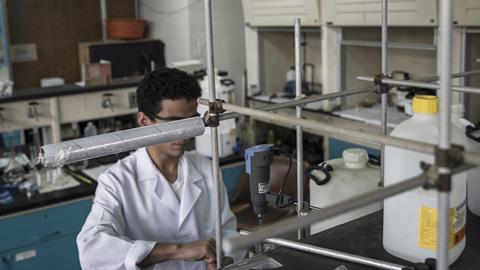

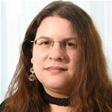



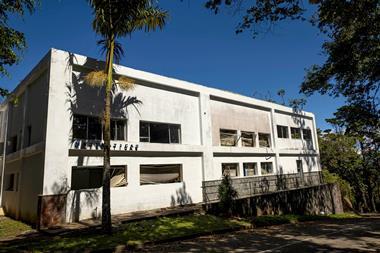
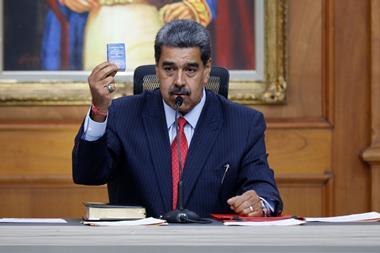










No comments yet